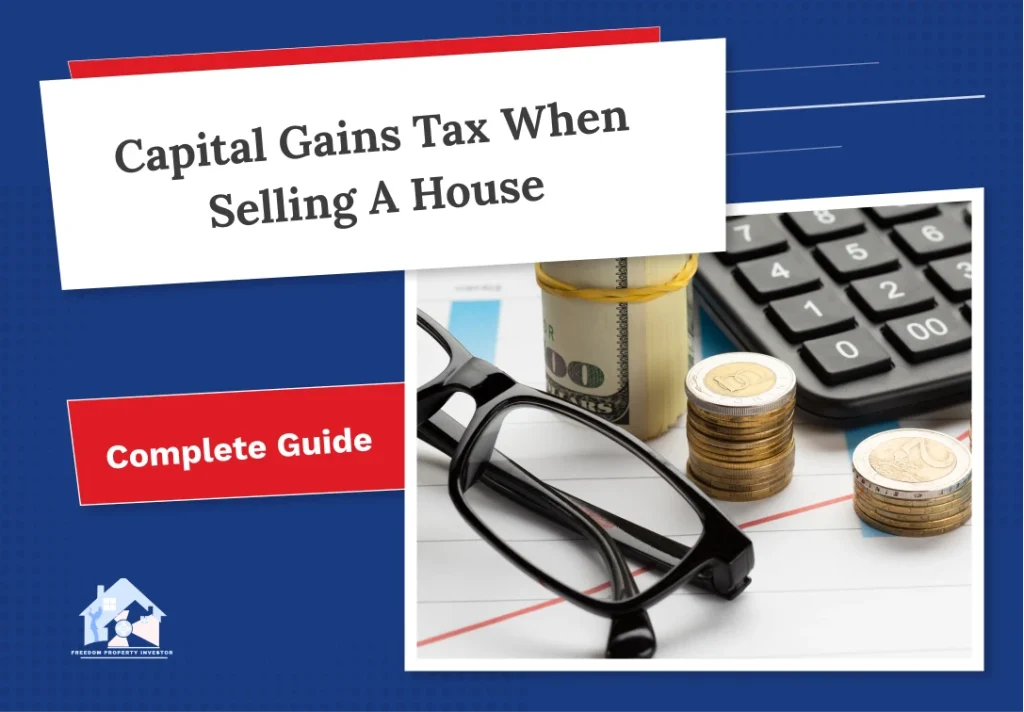Buying or selling a house is an exhilarating journey filled with excitement and anticipation. One crucial aspect that homeowners need to understand is the capital gains tax implications when selling a house. In this comprehensive guide, we will delve into the details of capital gains tax and how it applies to the sale of a house and provide valuable insights to navigate this complex subject. At Freedom Property Investors, we strive to provide the most accurate and up-to-date information to help you make informed decisions regarding your real estate transactions.
Are you ready to know more about capital gains tax? Let’s get started!
Understanding Capital Gains Tax
The profit from the sale of an asset, such as a house, stock, or other investment, is subject to capital gains tax. When you sell a house at a higher price than its original purchase price, the difference is considered a capital gain, and you may be liable to pay taxes on that gain. It is important to consider all house sales do not result in taxable gains. Several factors come into play when determining the applicability and amount of capital gains tax.
Primary Residence Exemption
One significant advantage for homeowners is the primary residence exemption, also known as the capital gains tax exclusion. With this exemption, homeowners can defer paying taxes on some capital gains from selling their primary residence. You must meet the criteria below to be eligible for capital gains.
Ownership and Use: The property should be your primary place of living for at least two or five years before selling that property.
Frequency Limitation: The primary residence exemption generally allows you to apply it to the sale of your main living place once every two years. However, there are exceptions for unforeseen circumstances such as health-related issues, job relocations, or other eligible cases.
By meeting these criteria, homeowners can potentially exclude a considerable portion of the capital gains from their primary residence sale from being subject to taxation. This exemption can significantly reduce the financial burden associated with capital gains tax and give homeowners more flexibility and financial advantages when selling their primary residence.
Calculating Capital Gains
To get an estimate for the capital gains tax owed on the sale of a house, you need to determine the adjusted basis and the selling price. The house’s original purchase price, including any eligible improvements and deductions, is the adjusted basis. In contrast, the selling price is the amount for which the property is sold. The house’s original purchase price, including any eligible improvements and deductions, is the adjusted basis. On the other hand, the price at which the property is sold is known as the selling cost. The capital gain is the difference between the selling price and the adjusted basis.
Long-Term vs. Short-Term Capital Gains
Capital gains are categorized as either long-term or short-term, depending on the duration you held the property before selling it. Any gains made after selling the property are considered short-term capital gains and are known as ordinary income tax if you had the property for at least one year. But, if the property were over one year, the gains would be considered long-term capital gains and subject to different tax rates.
Tax Rates and Exceptions
Capital gains tax may vary depending on many factors, such as income and living status. Long-term capital gain taxes are lower than the ordinary income of a person. Suppose you want to know the exact tax rates that apply to your situation. In that case, you need to talk to a tax professional or look at the guidelines provided by the Internal Revenue Service (IRS).
Additionally, exceptions and deductions may further reduce the taxable amount or exempt you from capital gains tax. These exceptions include but are not limited to
- Home repairs and renovations enhance the demand for the property.
- Costs of selling the house, such as commissions of real estate agents or any other fee.
- Capital loss from any other investment may also result in capital gain.
- Section 1031 exchanges which are also subject to the capital gains tax by reinvesting into the property, which is the same in structure.
Recordkeeping And Reporting
Proper recordkeeping is essential when it comes to capital gains tax. It is crucial to maintain accurate documentation of the property’s purchase price, improvements, and any expenses incurred during the selling process. This data will be vital while announcing the offer of your home on your tax return.
You will need to fill out IRS Form 8949, and you are required to report the details of the sale, such as the selling price, adjusted basis, and calculate capital gain. It is advisable to seek professional tax advice or utilize tax software to ensure accurate reporting and compliance with IRS regulations.
Sell your House With Freedom Property Investors
Navigating the realm of capital gains tax when selling a house can be a complex task. Understanding the applicable rules, exemptions, and tax rates is crucial to avoid surprises and ensure compliance with tax obligations. In this article, we have covered the basics of capital gains tax, the primary residence exemption, calculating capital gains, differentiating between long-term and short-term gains, applicable tax rates, exceptions, and the importance of proper recordkeeping and reporting.
Freedom Property Investors are committed to providing valuable resources and information to empower your decision-making process. However, to address your particular circumstances and receive personalized advice, it is essential to speak with our representatives. Understanding capital gains tax is just one piece of the puzzle when selling a house, which has significant financial ramifications. You can confidently navigate the real estate market and make well-informed decisions that align with your financial objectives with the right information and direction.




